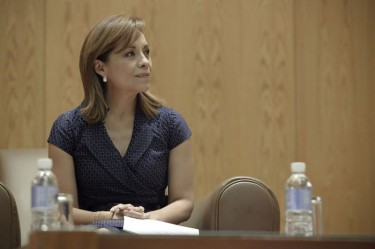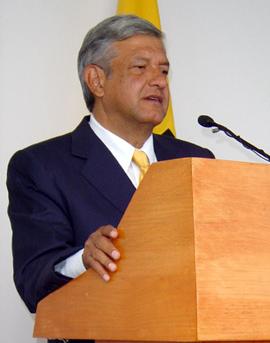After the governing political party finalized their candidate on February 5, 2012, for this year's upcoming election, the list of competitors for Mexico's presidential race appears ready.
The candidates
Although no one can be formally considered a candidate for the presidency at the moment, according to Mexico's electoral legislation, the country's main political forces have already designated their “virtual candidates.” So, on the part of the Partido Acción Nacional (the party in power) Josefina Eugenia Vazquez Mota was chosen to contend for the presidency. For the Partido de la Revolución Democrática the virtual candidate is Andrés Manuel López Obrador, who participated in the process six years ago, and upon not being favored deemed himself to be the “legitimate president of Mexico.” For the Partido Revolucionario Institucional (which maintained power from 1929 until 2000) Enrique Peña Nieto will be the candidate.
Reactions in the blogosphere
Varied commentary has arisen from the Mexican blogosphere; much of which for whatever reason has concentrated on the mistakes made by the “virtual candidates” or on the droll moments that attract attention. Nevertheless, some bloggers have ventured to write about what can be expected from the electoral process, which has only but a recent history in the country; such is the case of Carlos Gómez Luna [es], who wrote:

Josefina Vazquez Mota, image from Wikimedia Commons under Creative Commons Attribution 3.0 license, not adapted
En el desarrollo del proceso electoral sin duda aún faltan muchas cosas por conocerse, como las estrategias de campaña, la plataforma electoral de las alianzas, los errores que pudieran cometerse por parte de los equipos de los candidatos, y sobre todo el comportamiento que tendrá la Presidencia de la República, que como observamos en la contienda presidencial pasada, fue un factor determinante en el resultado final, incluso reconocido por la propia Suprema Corte de Justicia de la Nación. En este sentido ya se han dado algunas señales como la anulación de los comicios en la capital del Estado de Michoacán, la sospecha aún sin sustento pero probable del aprovechamiento de los programas de beneficio social para encauzar el voto y la retención de presupuesto federal asignado a los Estados gobernados por partidos políticos distintos al del Presidente.
On the other hand, the blog Liberal Mexiquense [es] wrote with skepticism, remembering the result of past electoral processes and some of the undue practices that persist within the political system of the country:
Así, cada sexenio se repite ese clamor de esperanza ciudadana que rápidamente es acallado por la sucesión de gobiernos fallidos que se esmeran en operar contrariamente a lo prometido.
Por igual, procesos electorales que en repetidas ocasiones responden a guiones preestablecidos y cansinos ensayos montados desde hace décadas con una buena dosis de melodrama y tragicomedia, no exenta de humor negro.
Cultura del pasado que todavía acumula un catálogo de términos donde anidan actitudes y conductas, aún con vigencia: “dedazos”, “compra de votos”, “acarreo”, “campañas faraónicas”, “pago de cuotas”, “regalitos del candidato” o el proverbial “reparto de tortas” que la modernidad ha convertido con su milagrería, no en la multiplicación de panes y vino, sino en “bonos fraternales” para la hamburguesería más próxima al mitin.
So, every six years we repeat this clamor of citizen hope that is quickly quieted by the succession of failed governments that strive to operate contrary to what is promised.
Equally, electoral processes that on repeated occasions respond to preestablished scripts and weary trials mounted since decades ago with a good dose of melodrama and tragicomedy, not without black humor.
Past culture that still accumulates a catalogue of terminology within such nest attitudes and behaviors, even with validity: “thick fingers”, “vote-buying”, “haulage”, “pharaonic campaigns”, “payment of fees”, “gifts from the candidate” or the proverbial “allocation of cakes” which modernity has changed, because of it's misrecognition of miracles, not into the multiplication of bread and wine, but into “fraternal bonds” for the hamburger joint closest to the rally.
Toward the end of the past year, the blog Sopitas [es] prepared an interesting infographic [es] about the bids of the parties and their candidates. The same authors recently spoke on the need for more candidates, alluding to the confusion over the current bid:
No sé qué piensen ustedes pero en un proceso idílico, lo único que podemos pensar es que nos gustaría que alguna fuerza de la justicia universal abriera las filas de candidatos y nos diera más opciones que los flancos artificiales de nuestra política; porque las cosas, en lugar de definirse, cada vez nos generan mayor confusión.
Reactions on Twitter
Several users were interested in the visual pollution that the electoral process has generated so far. Dr. Miguel Carbonell (@MiguelCarbonell) [es] suggested:
Quienes han inundado la ciudad con tanta basura (pre)electoral deberían comprometerse a recogerla y reciclarla.
On the same topic, Malú Flores (@maluflores) [es] pointed out:
Curioso que el progresismo, que jura cuidar el medio ambiente, sea el sector que más propaganda electoral (basura) tiene en las calles

Enrique Peña Nieto, image from Wikimedia Common under Creative Commons Generic Attribution/ShareAlike 2.0 license
Commentator Brozo (@brozoxmiswebs) [es] in colloquial language (as is the usual), referred to one of the most important topics to the electorate and one that was recently addressed on the political agenda of the head of the Secretary of the National Defense: security.
Galván Galván [actual Secretario de Defensa Nacional] reconoce al chile pelón [sin reservas], que la seguridad interior se encuentra seriamente amenazada. Qué candidat@ podrá con ése paquetito?
However, as it was noted previously, many users continue to be focused principally on the gaffes of the “virtual candidates”, such as Armando Cornejo (@acornejoi) [es] who recently referred to an episode which featured a candidate demonstrating his lacking reading skills at the International Book Fair:
Por qué vas a votar x #EPN [Enrique Peña Nieto] del #PRI? Seguramente te has quedado sin respuesta; casi como #PenaNieto en la #FIL [Feria Internacional del Libro]… caray que PENA
On Sunday, July 1, 2012, Mexico will elect someone to take over the Presidency of the Republic for the 2012 – 2018 term. In the upcoming months, there will be many expressions of support for or disapproval of the candidates; we will be on the lookout for the critical and analytic voices that will help us to understand the development of the electoral process in this North American nation.








9 comments